How God Answers the Soul by Mechthild of Magdeburg
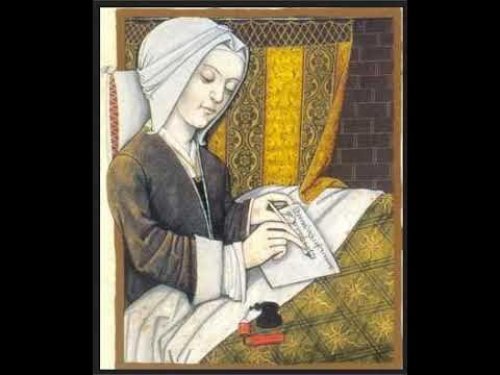
It is my nature that makes me love you often,
For I am love itself.
It is my longing that makes my love you intensely,
For I yearn to be loved from the heart.
It is my eternity that makes me love you long,
For I have no end.
Read Poem For I am love itself.
It is my longing that makes my love you intensely,
For I yearn to be loved from the heart.
It is my eternity that makes me love you long,
For I have no end.
0
Notes on “The Scream” by Edvard Munch
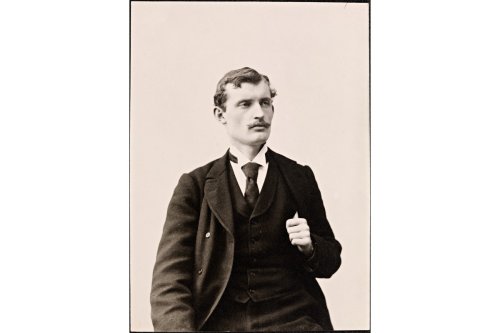
notat 615
Jeg gik bortover veien med
to venner—
så gik solen ned
Himmelen blev pludseli blod
—og jeg følte som et pust af vemod—
en sugende smerte under hjertet
{S}Jeg standset—lænet mig
Read Poem Jeg gik bortover veien med
to venner—
så gik solen ned
Himmelen blev pludseli blod
—og jeg følte som et pust af vemod—
en sugende smerte under hjertet
{S}Jeg standset—lænet mig
0
Love Songs by Mina Loy
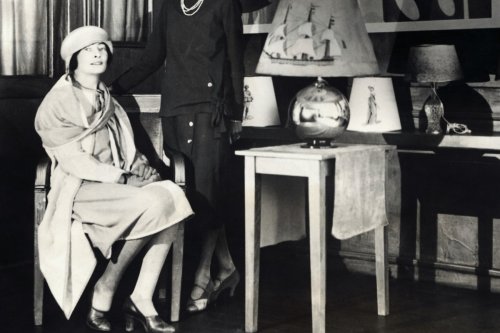
I
Spawn of fantasies
Sifting the appraisable
Pig Cupid his rosy snout
Rooting erotic garbage
"Once upon a time"
Pulls a weed white star-topped
Among wild oats sown in mucous membrane
Read Poem Spawn of fantasies
Sifting the appraisable
Pig Cupid his rosy snout
Rooting erotic garbage
"Once upon a time"
Pulls a weed white star-topped
Among wild oats sown in mucous membrane
0
Modest Proposals by Stephen Sandy

A longish poem about wallpaper.
A short lyric about discouragement in white.
A medium-length thesis of uncertain importance.
Another sonnet, about scholarship.
A couplet of olives.
A long narrative about the exaggeration of your absence.
Several quatrains about candle stubs.
That old sestina on Isaiah.
Palindromes about Scots presbyters of the 18th century.
Some rock lyrics from Benares.
A nature poem about committees.
Seven heroic couplets about Art Murphy.
Several more heroic couplets on Murphy’s Law.
Read Poem A short lyric about discouragement in white.
A medium-length thesis of uncertain importance.
Another sonnet, about scholarship.
A couplet of olives.
A long narrative about the exaggeration of your absence.
Several quatrains about candle stubs.
That old sestina on Isaiah.
Palindromes about Scots presbyters of the 18th century.
Some rock lyrics from Benares.
A nature poem about committees.
Seven heroic couplets about Art Murphy.
Several more heroic couplets on Murphy’s Law.
0
Old Woman Nature by Gary Snyder

Old Woman Nature
naturally has a bag of bones
tucked away somewhere.
a whole room full of bones!
A scattering of hair and cartilage
bits in the woods.
A fox scat with hair and a tooth in it.
a shellmound
Read Poem naturally has a bag of bones
tucked away somewhere.
a whole room full of bones!
A scattering of hair and cartilage
bits in the woods.
A fox scat with hair and a tooth in it.
a shellmound
0
Amour 30: Three sorts of serpents do resemble thee by Michael Drayton

Three sorts of serpents do resemble thee:
That dangerous eye-killing cockatrice,
The enchanting siren, which doth so entice,
The weeping crocodile—these vile pernicious three.
The basilisk his nature takes from thee,
Who for my life in secret wait dost lie,
And to my heart sendst poison from thine eye:
Thus do I feel the pain, the cause, yet cannot see.
Fair-maid no more, but Mer-maid be thy name,
Who with thy sweet alluring harmony
Hast played the thief, and stolen my heart from me,
And like a tyrant makst my grief thy game:
Thou crocodile, who when thou hast me slain,
Lamentst my death, with tears of thy disdain.
Read Poem That dangerous eye-killing cockatrice,
The enchanting siren, which doth so entice,
The weeping crocodile—these vile pernicious three.
The basilisk his nature takes from thee,
Who for my life in secret wait dost lie,
And to my heart sendst poison from thine eye:
Thus do I feel the pain, the cause, yet cannot see.
Fair-maid no more, but Mer-maid be thy name,
Who with thy sweet alluring harmony
Hast played the thief, and stolen my heart from me,
And like a tyrant makst my grief thy game:
Thou crocodile, who when thou hast me slain,
Lamentst my death, with tears of thy disdain.
0
Now I knew I lost her — (1274) by Emily Dickinson
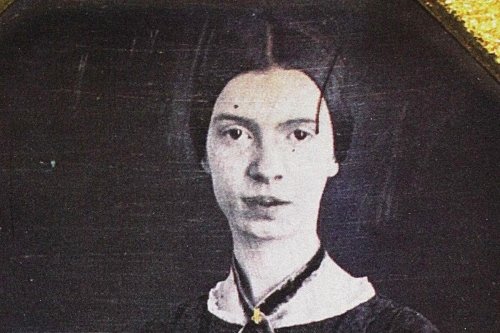
Now I knew I lost her —
Not that she was gone —
But Remoteness travelled
On her Face and Tongue.
Alien, though adjoining
As a Foreign Race —
Traversed she though pausing
Latitudeless Place.
Read Poem Not that she was gone —
But Remoteness travelled
On her Face and Tongue.
Alien, though adjoining
As a Foreign Race —
Traversed she though pausing
Latitudeless Place.
0
The Mushroom is the Elf of Plants - (1350) by Emily Dickinson

The Mushroom is the Elf of Plants -
At Evening, it is not
At Morning, in a Truffled Hut
It stop opon a Spot
As if it tarried always
And yet it’s whole Career
Is shorter than a Snake’s Delay -
And fleeter than a Tare -
Read Poem At Evening, it is not
At Morning, in a Truffled Hut
It stop opon a Spot
As if it tarried always
And yet it’s whole Career
Is shorter than a Snake’s Delay -
And fleeter than a Tare -
0
Gliding O'er All by Walt Whitman
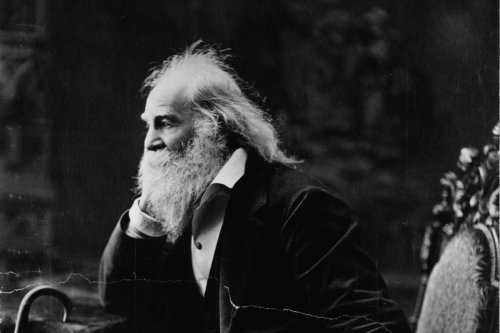
Gliding o'er all, through all,
Through Nature, Time, and Space,
As a ship on the waters advancing,
The voyage of the soul—not life alone,
Death, many deaths I'll sing.
Read Poem Through Nature, Time, and Space,
As a ship on the waters advancing,
The voyage of the soul—not life alone,
Death, many deaths I'll sing.
0
To her Sister Mistress A. B. by Isabella Whitney

Because I to my brethern wrote
and to my sisters two:
Good sister Anne, you this might wote,
if so I should not do
To you, or ere I parted hence,
You vainly had bestowed expence.
Yet is it not for that I write,
for nature did you bind
To do me good, and to requite
hath nature me inclined:
Wherefore good sister take in gree
These simple lines that come from me.
Wherein I wish you Nestor's days,
Read Poem and to my sisters two:
Good sister Anne, you this might wote,
if so I should not do
To you, or ere I parted hence,
You vainly had bestowed expence.
Yet is it not for that I write,
for nature did you bind
To do me good, and to requite
hath nature me inclined:
Wherefore good sister take in gree
These simple lines that come from me.
Wherein I wish you Nestor's days,
0
Book 7, Epigram 47: De Hominis Ortu & Sepultura. by Thomas Bastard

Nature which headlong into life doth throw us,
With our feet forward to our grave doth bring us,
What is less ours, than this our borrowed breath,
We stumble into life, we go to death.
Read Poem With our feet forward to our grave doth bring us,
What is less ours, than this our borrowed breath,
We stumble into life, we go to death.
0
On a Piece of Tapestry by George Santayana
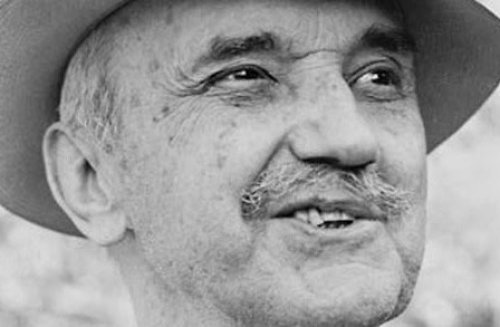
Hold high the woof, dear friends, that we may see
The cunning mixture of its colours rare.
Nothing in nature purposely is fair,—
Her beauties in their freedom disagree;
But here all vivid dyes that garish be,
To that tint mellowed which the sense will bear,
Glow, and not wound the eye that, resting there,
Lingers to feed its gentle ecstacy.
Crimson and purple and all hues of wine,
Saffron and russet, brown and sober green
Are rich the shadowy depths of blue between;
While silver threads with golden intertwine,
To catch the glimmer of a fickle sheen,—
All the long labour of some captive queen.
Read Poem The cunning mixture of its colours rare.
Nothing in nature purposely is fair,—
Her beauties in their freedom disagree;
But here all vivid dyes that garish be,
To that tint mellowed which the sense will bear,
Glow, and not wound the eye that, resting there,
Lingers to feed its gentle ecstacy.
Crimson and purple and all hues of wine,
Saffron and russet, brown and sober green
Are rich the shadowy depths of blue between;
While silver threads with golden intertwine,
To catch the glimmer of a fickle sheen,—
All the long labour of some captive queen.
0
Sonnet 84: While one sere leaf, that parting Autumn yields by Anna Seward
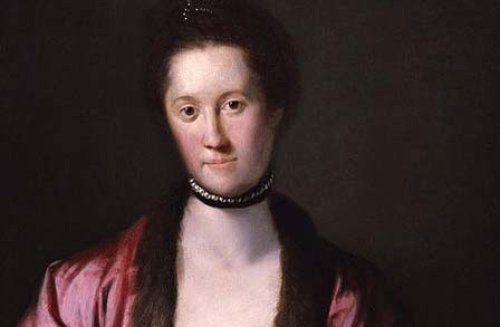
While one sere leaf, that parting Autumn yields,
Trembles upon the thin, and naked spray,
November, dragging on this sunless day,
Lours, cold and sullen, on the watery fields;
And Nature to the waste dominion yields,
Stripped her last robes, with gold and purple gay —
So droops my life, of your soft beams despoiled,
Youth, Health, and Hope, that long exulting smiled;
And the wild carols, and the bloomy hues
Of merry Spring-time, spruce on every plain
Her half-blown bushes, moist with sunny rain,
More pensive thoughts in my sunk heart infuse
Than Winter’s grey, and desolate domain
Faded like my lost Youth, that no bright Spring renews.
Read Poem Trembles upon the thin, and naked spray,
November, dragging on this sunless day,
Lours, cold and sullen, on the watery fields;
And Nature to the waste dominion yields,
Stripped her last robes, with gold and purple gay —
So droops my life, of your soft beams despoiled,
Youth, Health, and Hope, that long exulting smiled;
And the wild carols, and the bloomy hues
Of merry Spring-time, spruce on every plain
Her half-blown bushes, moist with sunny rain,
More pensive thoughts in my sunk heart infuse
Than Winter’s grey, and desolate domain
Faded like my lost Youth, that no bright Spring renews.
0
To Wordsworth by Percy Bysshe Shelley
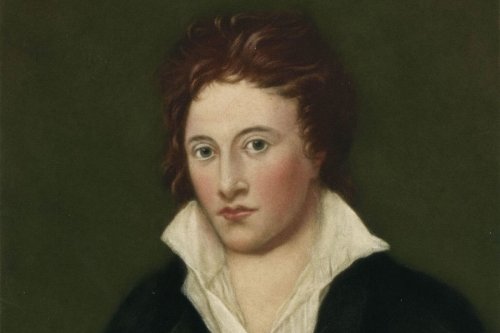
Poet of Nature, thou hast wept to know
That things depart which never may return:
Childhood and youth, friendship and love’s first glow,
Have fled like sweet dreams, leaving thee to mourn.
These common woes I feel. One loss is mine
Which thou too feel’st, yet I alone deplore.
Thou wert as a lone star, whose light did shine
On some frail bark in winter’s midnight roar:
Read Poem That things depart which never may return:
Childhood and youth, friendship and love’s first glow,
Have fled like sweet dreams, leaving thee to mourn.
These common woes I feel. One loss is mine
Which thou too feel’st, yet I alone deplore.
Thou wert as a lone star, whose light did shine
On some frail bark in winter’s midnight roar:
0
His Farewell to Sack by Robert Herrick

Farewell thou thing, time past so known, so dear
To me as blood to life and spirit; near,
Nay, thou more near than kindred, friend, man, wife,
Male to the female, soul to body; life
To quick action, or the warm soft side
Of the resigning, yet resisting bride.
The kiss of virgins, first fruits of the bed,
Soft speech, smooth touch, the lips, the maidenhead :
These and a thousand sweets could never be
So near or dear as thou wast once to me.
O thou, the drink of gods and angels! wine
That scatter'st spirit and lust, whose purest shine
More radiant than the summer's sunbeam shows;
Each way illustrious, brave, and like to those
Comets we see by night, whose shagg'd portents
Read Poem To me as blood to life and spirit; near,
Nay, thou more near than kindred, friend, man, wife,
Male to the female, soul to body; life
To quick action, or the warm soft side
Of the resigning, yet resisting bride.
The kiss of virgins, first fruits of the bed,
Soft speech, smooth touch, the lips, the maidenhead :
These and a thousand sweets could never be
So near or dear as thou wast once to me.
O thou, the drink of gods and angels! wine
That scatter'st spirit and lust, whose purest shine
More radiant than the summer's sunbeam shows;
Each way illustrious, brave, and like to those
Comets we see by night, whose shagg'd portents
0
Floating Island by Dorothy Wordsworth
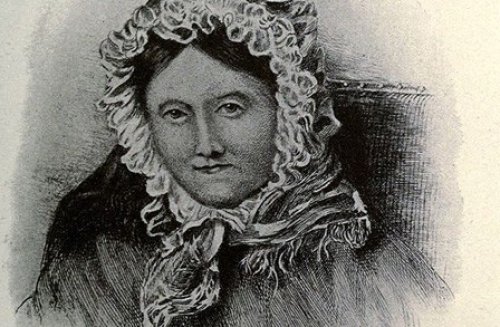
Harmonious Powers with Nature work
On sky, earth, river, lake, and sea:
Sunshine and storm, whirlwind and breeze
All in one duteous task agree.
Once did I see a slip of earth,
By throbbing waves long undermined,
Loosed from its hold; — how no one knew
But all might see it float, obedient to the wind.
Might see it, from the mossy shore
Dissevered float upon the Lake,
Float, with its crest of trees adorned
On which the warbling birds their pastime take.
Read Poem On sky, earth, river, lake, and sea:
Sunshine and storm, whirlwind and breeze
All in one duteous task agree.
Once did I see a slip of earth,
By throbbing waves long undermined,
Loosed from its hold; — how no one knew
But all might see it float, obedient to the wind.
Might see it, from the mossy shore
Dissevered float upon the Lake,
Float, with its crest of trees adorned
On which the warbling birds their pastime take.
0
“How oft in schoolboy-days, from the school’s sway” by Frederick Goddard Tuckerman
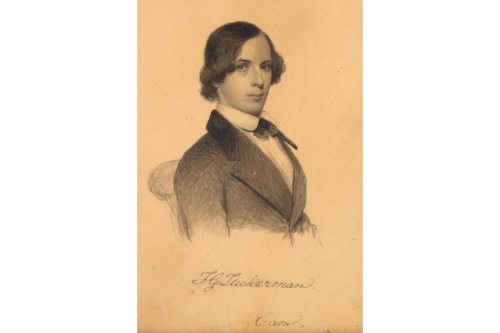
from Sonnets, Second Series
XXIX
How oft in schoolboy-days, from the school’s sway
Have I run forth to Nature as to a friend,—
With some pretext of o’erwrought sight, to spend
My school-time in green meadows far away!
Read Poem XXIX
How oft in schoolboy-days, from the school’s sway
Have I run forth to Nature as to a friend,—
With some pretext of o’erwrought sight, to spend
My school-time in green meadows far away!
0
Lines Composed a Few Miles above Tintern Abbey, On Revisiting the Banks of the Wye during a Tour. July 13, 1798 by William Wordsworth
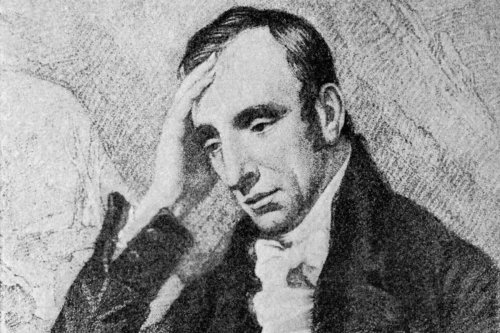
Five years have past; five summers, with the length
Of five long winters! and again I hear
These waters, rolling from their mountain-springs
With a soft inland murmur.—Once again
Do I behold these steep and lofty cliffs,
That on a wild secluded scene impress
Thoughts of more deep seclusion; and connect
The landscape with the quiet of the sky.
Read Poem Of five long winters! and again I hear
These waters, rolling from their mountain-springs
With a soft inland murmur.—Once again
Do I behold these steep and lofty cliffs,
That on a wild secluded scene impress
Thoughts of more deep seclusion; and connect
The landscape with the quiet of the sky.
0
Modern Love XXX by George Meredith
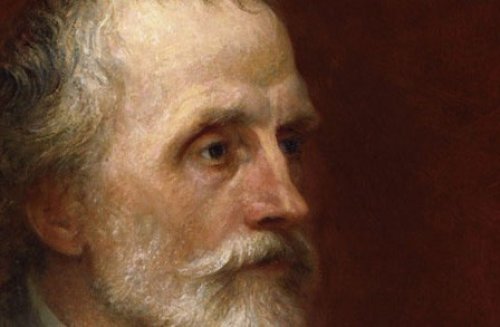
What are we first? First, animals; and next
Intelligences at a leap; on whom
Pale lies the distant shadow of the tomb,
And all that draweth on the tomb for text.
Into which state comes Love, the crowning sun:
Beneath whose light the shadow loses form.
We are the lords of life, and life is warm.
Intelligence and instinct now are one.
But nature says: "My children most they seem
When they least know me: therefore I decree
That they shall suffer." Swift doth young Love flee,
And we stand wakened, shivering from our dream.
Then if we study Nature we are wise.
Thus do the few who live but with the day:
The scientific animals are they—
Read Poem Intelligences at a leap; on whom
Pale lies the distant shadow of the tomb,
And all that draweth on the tomb for text.
Into which state comes Love, the crowning sun:
Beneath whose light the shadow loses form.
We are the lords of life, and life is warm.
Intelligence and instinct now are one.
But nature says: "My children most they seem
When they least know me: therefore I decree
That they shall suffer." Swift doth young Love flee,
And we stand wakened, shivering from our dream.
Then if we study Nature we are wise.
Thus do the few who live but with the day:
The scientific animals are they—
0
To the Shade of Burns by Charlotte Smith
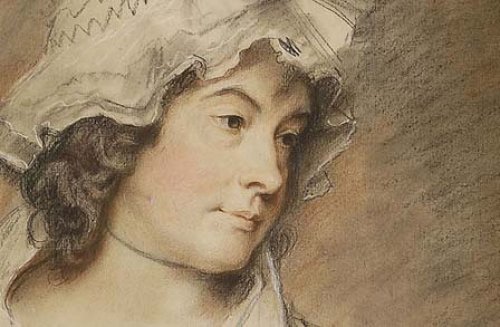
Mute is thy wild harp, now, O Bard sublime!
Who, amid Scotia’s mountain solitude,
Great Nature taught to “build the lofty rhyme,”
And even beneath the daily pressure, rude,
Of laboring Poverty, thy generous blood,
Fired with the love of freedom—Not subdued
Wert thou by thy low fortune: But a time
Like this we live in, when the abject chime
Of echoing Parasite is best approved,
Was not for thee—Indignantly is fled
Thy noble Spirit; and no longer moved
By all the ills o’er which thine heart has bled,
Associate worthy of the illustrious dead,
Enjoys with them “the Liberty it loved.”
Read Poem Who, amid Scotia’s mountain solitude,
Great Nature taught to “build the lofty rhyme,”
And even beneath the daily pressure, rude,
Of laboring Poverty, thy generous blood,
Fired with the love of freedom—Not subdued
Wert thou by thy low fortune: But a time
Like this we live in, when the abject chime
Of echoing Parasite is best approved,
Was not for thee—Indignantly is fled
Thy noble Spirit; and no longer moved
By all the ills o’er which thine heart has bled,
Associate worthy of the illustrious dead,
Enjoys with them “the Liberty it loved.”
0
Why I Voted the Socialist Ticket by Vachel Lindsay
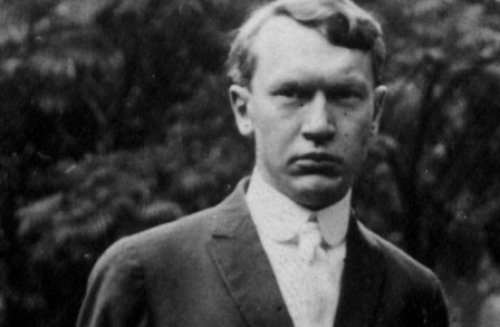
I am unjust, but I can strive for justice.
My life’s unkind, but I can vote for kindness.
I, the unloving, say life should be lovely.
I, that am blind, cry out against my blindness.
Man is a curious brute—he pets his fancies—
Fighting mankind, to win sweet luxury.
So he will be, though law be clear as crystal,
Tho’ all men plan to live in harmony.
Read Poem My life’s unkind, but I can vote for kindness.
I, the unloving, say life should be lovely.
I, that am blind, cry out against my blindness.
Man is a curious brute—he pets his fancies—
Fighting mankind, to win sweet luxury.
So he will be, though law be clear as crystal,
Tho’ all men plan to live in harmony.
0
Address to Venus by Lucretius

Delight of Human kind, and Gods above;
Parent of Rome; Propitious Queen of Love;
Whose vital pow’r, Air, Earth, and Sea supplies;
And breeds what e’r is born beneath the rowling Skies:
For every kind, by thy prolifique might,
Springs, and beholds the Regions of the light:
Thee, Goddess thee, the clouds and tempests fear,
And at thy pleasing presence disappear:
For thee the Land in fragrant Flow’rs is drest,
For thee the Ocean smiles, and smooths her wavy breast;
And Heav’n it self with more serene, and purer light is blest.
For when the rising Spring adorns the Mead,
And a new Scene of Nature stands display’d,
When teeming Budds, and chearful greens appear,
And Western gales unlock the lazy year,
Read Poem Parent of Rome; Propitious Queen of Love;
Whose vital pow’r, Air, Earth, and Sea supplies;
And breeds what e’r is born beneath the rowling Skies:
For every kind, by thy prolifique might,
Springs, and beholds the Regions of the light:
Thee, Goddess thee, the clouds and tempests fear,
And at thy pleasing presence disappear:
For thee the Land in fragrant Flow’rs is drest,
For thee the Ocean smiles, and smooths her wavy breast;
And Heav’n it self with more serene, and purer light is blest.
For when the rising Spring adorns the Mead,
And a new Scene of Nature stands display’d,
When teeming Budds, and chearful greens appear,
And Western gales unlock the lazy year,
0
Astrophil and Stella 5: It is most true, that eyes are formed to serve by Sir Philip Sidney

It is most true, that eyes are formed to serve
The inward light; and that the heavenly part
Ought to be king, from whose rules who do swerve,
Rebels to Nature, strive for their own smart.
It is most true, what we call Cupid’s dart,
An image is, which for ourselves we carve;
And, fools, adore in temple of our heart,
Till that good god make Church and churchman starve.
True, that true beauty virtue is indeed,
Whereof this beauty can be but a shade,
Which elements with mortal mixture breed;
True, that on earth we are but pilgrims made,
And should in soul up to our country move;
True; and yet true, that I must Stella love.
Read Poem The inward light; and that the heavenly part
Ought to be king, from whose rules who do swerve,
Rebels to Nature, strive for their own smart.
It is most true, what we call Cupid’s dart,
An image is, which for ourselves we carve;
And, fools, adore in temple of our heart,
Till that good god make Church and churchman starve.
True, that true beauty virtue is indeed,
Whereof this beauty can be but a shade,
Which elements with mortal mixture breed;
True, that on earth we are but pilgrims made,
And should in soul up to our country move;
True; and yet true, that I must Stella love.
0
Chorus Sacerdotum by Baron Brooke Fulke Greville
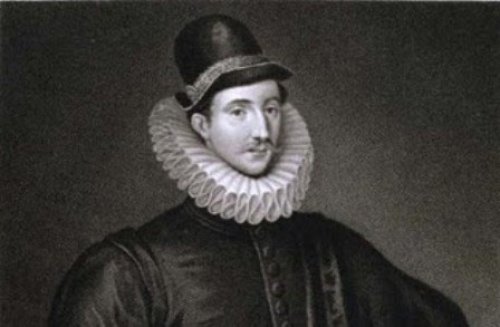
from Mustapha O wearisome condition of humanity!
Born under one law, to another bound;
Read Poem Born under one law, to another bound;
0
Despotisms by Louise Imogen Guiney
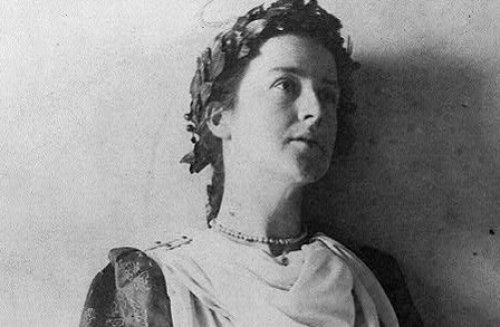
I: THE MOTOR: 1905
From hedgerows where aromas fain would be
New volleyed odours execrably arise;
The flocks, with hell-smoke in their patient eyes,
Into the ditch from bawling ruin flee:
Spindrift of one abominated sea
Along all roads in wrecking fury flies
Till on young strangled leaf, on bloom that dies,
Read Poem From hedgerows where aromas fain would be
New volleyed odours execrably arise;
The flocks, with hell-smoke in their patient eyes,
Into the ditch from bawling ruin flee:
Spindrift of one abominated sea
Along all roads in wrecking fury flies
Till on young strangled leaf, on bloom that dies,
0
Dying Speech of an Old Philosopher by Walter Savage Landor
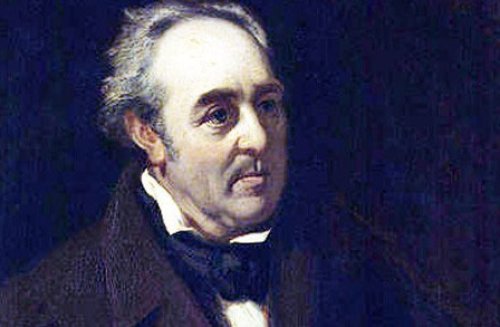
I strove with none, for none was worth my strife:
Nature I loved, and, next to Nature, Art:
I warm’d both hands before the fire of Life;
It sinks; and I am ready to depart.
Read Poem Nature I loved, and, next to Nature, Art:
I warm’d both hands before the fire of Life;
It sinks; and I am ready to depart.
0
For Christmas Day by Charles Wesley
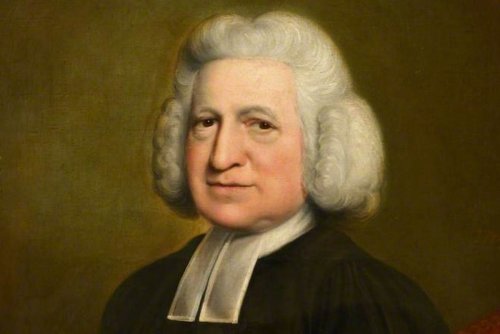
Hark, how all the welkin rings,
“Glory to the King of kings;
Peace on earth, and mercy mild,
God and sinners reconcil’d!”
Joyful, all ye nations, rise,
Join the triumph of the skies;
Universal nature say,
Read Poem “Glory to the King of kings;
Peace on earth, and mercy mild,
God and sinners reconcil’d!”
Joyful, all ye nations, rise,
Join the triumph of the skies;
Universal nature say,
0
I Used to Think by Trumbull Stickney
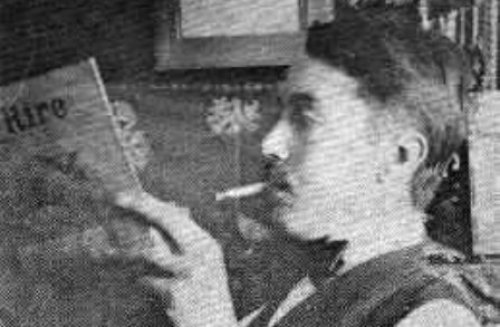
I used to think
The mind essential in the body, even
As stood the body essential in the mind:
Two inseparable things, by nature equal
And similar, and in creation’s song
Halving the total scale: it is not so.
Unlike and cross like driftwood sticks they come
Churned in the giddy trough: a chunk of pine,
A slab of rosewood: mangled each on each
With knocks and friction, or in deadly pain
Sheathing each other’s splinters: till at last
Without all stuff or shape they ’re jetted up
Where in the bluish moisture rot whate’er
Was vomited in horror from the sea.
Read Poem The mind essential in the body, even
As stood the body essential in the mind:
Two inseparable things, by nature equal
And similar, and in creation’s song
Halving the total scale: it is not so.
Unlike and cross like driftwood sticks they come
Churned in the giddy trough: a chunk of pine,
A slab of rosewood: mangled each on each
With knocks and friction, or in deadly pain
Sheathing each other’s splinters: till at last
Without all stuff or shape they ’re jetted up
Where in the bluish moisture rot whate’er
Was vomited in horror from the sea.
0
The Mock Song by John Wilmot Earl of Rochester

I swive as well as others do,
I’m young, not yet deformed,
My tender heart, sincere, and true,
Deserves not to be scorned.
Why Phyllis then, why will you swive,
With forty lovers more?
Can I (said she) with Nature strive,
Alas I am, alas I am a whore.
Were all my body larded o’er,
With darts of love, so thick,
That you might find in ev’ry pore,
A well stuck standing prick;
Read Poem I’m young, not yet deformed,
My tender heart, sincere, and true,
Deserves not to be scorned.
Why Phyllis then, why will you swive,
With forty lovers more?
Can I (said she) with Nature strive,
Alas I am, alas I am a whore.
Were all my body larded o’er,
With darts of love, so thick,
That you might find in ev’ry pore,
A well stuck standing prick;
0
The Mower against Gardens by Andrew Marvell
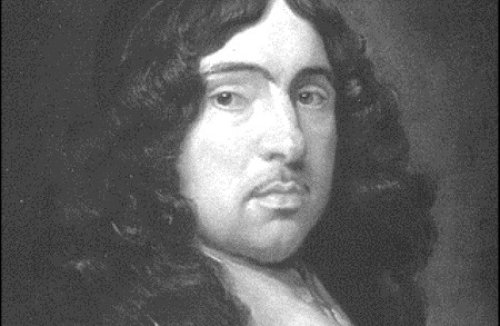
Luxurious man, to bring his vice in use,
Did after him the world seduce,
And from the fields the flowers and plants allure,
Where nature was most plain and pure.
He first enclosed within the gardens square
A dead and standing pool of air,
And a more luscious earth for them did knead,
Which stupified them while it fed.
Read Poem Did after him the world seduce,
And from the fields the flowers and plants allure,
Where nature was most plain and pure.
He first enclosed within the gardens square
A dead and standing pool of air,
And a more luscious earth for them did knead,
Which stupified them while it fed.
0
Nature, That Washed Her Hands in Milk by Sir Walter Ralegh

Nature, that washed her hands in milk,
And had forgot to dry them,
Instead of earth took snow and silk,
At love’s request to try them,
If she a mistress could compose
To please love’s fancy out of those.
Her eyes he would should be of light,
A violet breath, and lips of jelly;
Her hair not black, nor overbright,
And of the softest down her belly;
As for her inside he’d have it
Only of wantonness and wit.
At love’s entreaty such a one
Read Poem And had forgot to dry them,
Instead of earth took snow and silk,
At love’s request to try them,
If she a mistress could compose
To please love’s fancy out of those.
Her eyes he would should be of light,
A violet breath, and lips of jelly;
Her hair not black, nor overbright,
And of the softest down her belly;
As for her inside he’d have it
Only of wantonness and wit.
At love’s entreaty such a one
0
Part for the Whole by Robert Francis
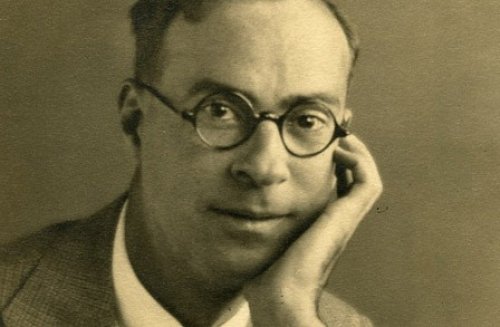
When others run to windows or out of doors
To catch the sunset whole, he is content
With any segment anywhere he sits.
From segment, fragment, he can reconstruct
The whole, prefers to reconstruct the whole,
As if to say, I see more seeing less.
A window to the east will serve as well
As window to the west, for eastern sky
Read Poem To catch the sunset whole, he is content
With any segment anywhere he sits.
From segment, fragment, he can reconstruct
The whole, prefers to reconstruct the whole,
As if to say, I see more seeing less.
A window to the east will serve as well
As window to the west, for eastern sky
0
Song from The Indian Emperor by John Dryden
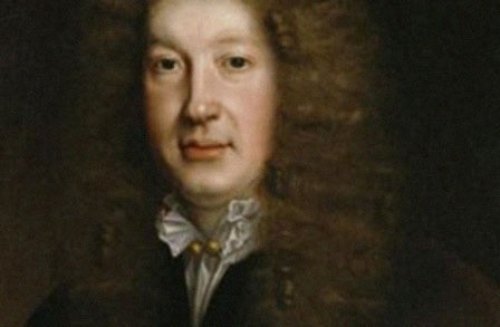
Ah, fading joy, how quickly art thou past!
Yet we thy ruin haste.
As if the cares of human life were few,
We seek out new:
And follow fate, which would too fast pursue.
See how on every bough the birds express
In their sweet notes their happiness.
They all enjoy and nothing spare;
But on their mother nature lay their care.
Why then should man, the lord of all below,
Such troubles choose to know
As none of all his subjects undergo?
Hark, hark, the waters fall, fall, fall,
And with a murmuring sound
Read Poem Yet we thy ruin haste.
As if the cares of human life were few,
We seek out new:
And follow fate, which would too fast pursue.
See how on every bough the birds express
In their sweet notes their happiness.
They all enjoy and nothing spare;
But on their mother nature lay their care.
Why then should man, the lord of all below,
Such troubles choose to know
As none of all his subjects undergo?
Hark, hark, the waters fall, fall, fall,
And with a murmuring sound
0
Sonnet 20: A woman’s face with nature’s own hand painted by William Shakespeare

A woman’s face with nature’s own hand painted
Hast thou, the master-mistress of my passion;
A woman’s gentle heart, but not acquainted
With shifting change as is false women’s fashion;
An eye more bright than theirs, less false in rolling,
Gilding the object whereupon it gazeth;
A man in hue, all hues in his controlling,
Which steals men’s eyes and women’s souls amazeth.
Read Poem Hast thou, the master-mistress of my passion;
A woman’s gentle heart, but not acquainted
With shifting change as is false women’s fashion;
An eye more bright than theirs, less false in rolling,
Gilding the object whereupon it gazeth;
A man in hue, all hues in his controlling,
Which steals men’s eyes and women’s souls amazeth.
0
Sonnet 109: O! never say that I was false of heart by William Shakespeare

O! never say that I was false of heart,
Though absence seemed my flame to qualify.
As easy might I from myself depart
As from my soul, which in thy breast doth lie:
That is my home of love; if I have ranged,
Like him that travels, I return again,
Just to the time, not with the time exchanged,
So that myself bring water for my stain.
Never believe, though in my nature reigned
All frailties that besiege all kinds of blood,
That it could so preposterously be stained,
To leave for nothing all thy sum of good;
For nothing this wide universe I call,
Save thou, my rose; in it thou art my all.
Read Poem Though absence seemed my flame to qualify.
As easy might I from myself depart
As from my soul, which in thy breast doth lie:
That is my home of love; if I have ranged,
Like him that travels, I return again,
Just to the time, not with the time exchanged,
So that myself bring water for my stain.
Never believe, though in my nature reigned
All frailties that besiege all kinds of blood,
That it could so preposterously be stained,
To leave for nothing all thy sum of good;
For nothing this wide universe I call,
Save thou, my rose; in it thou art my all.
0
Sonnet 126: O thou, my lovely boy, who in thy pow’r by William Shakespeare

O thou, my lovely boy, who in thy pow’r
Dost hold time’s fickle glass his sickle hour,
Who hast by waning grown, and therein show’st
Thy lovers withering, as thy sweet self grow’st—
In nature, sovereign mistress over wrack,
As thou goest onwards still will pluck thee back,
She keeps thee to this purpose, that her skill
May time disgrace, and wretched minute kill.
Yet fear her, O thou minion of her pleasure;
She may detain but not still keep her treasure.
Her audit, though delayed, answered must be,
And her quietus is to render thee.
Read Poem Dost hold time’s fickle glass his sickle hour,
Who hast by waning grown, and therein show’st
Thy lovers withering, as thy sweet self grow’st—
In nature, sovereign mistress over wrack,
As thou goest onwards still will pluck thee back,
She keeps thee to this purpose, that her skill
May time disgrace, and wretched minute kill.
Yet fear her, O thou minion of her pleasure;
She may detain but not still keep her treasure.
Her audit, though delayed, answered must be,
And her quietus is to render thee.
0
Sonnet: I Scarcely Grieve by Henry Timrod
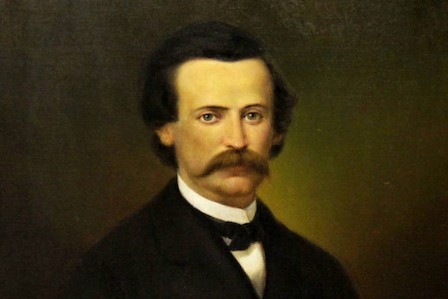
I scarcely grieve, O Nature! at the lot
That pent my life within a city’s bounds,
And shut me from thy sweetest sights and sounds.
Perhaps I had not learned, if some lone cot
Had nursed a dreamy childhood, what the mart
Taught me amid its turmoil; so my youth
Had missed full many a stern but wholesome truth.
Here, too, O Nature! in this haunt of Art,
Thy power is on me, and I own thy thrall.
There is no unimpressive spot on earth!
The beauty of the stars is over all,
And Day and Darkness visit every hearth.
Clouds do not scorn us: yonder factory’s smoke
Looked like a golden mist when morning broke.
Read Poem That pent my life within a city’s bounds,
And shut me from thy sweetest sights and sounds.
Perhaps I had not learned, if some lone cot
Had nursed a dreamy childhood, what the mart
Taught me amid its turmoil; so my youth
Had missed full many a stern but wholesome truth.
Here, too, O Nature! in this haunt of Art,
Thy power is on me, and I own thy thrall.
There is no unimpressive spot on earth!
The beauty of the stars is over all,
And Day and Darkness visit every hearth.
Clouds do not scorn us: yonder factory’s smoke
Looked like a golden mist when morning broke.
0
To Elizabeth, Countess of Rutland by Ben Jonson
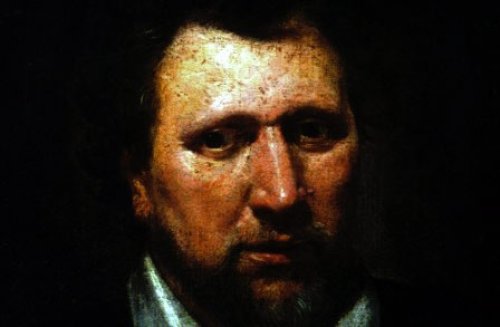
That poets are far rarer births than kings
Your noblest father proved; like whom before,
Or then, or since, about our Muses’ springs,
Came not that soul exhausted so their store.
Hence was it that the destinies decreed
(Save that most masculine issue of his brain)
No male unto him; who could so exceed
Nature, they thought, in all that he would fain.
At which she, happily displeased, made you,
On whom, if he were living now to look,
He should those rare and absolute numbers view,
As he would burn or better far his book.
Read Poem Your noblest father proved; like whom before,
Or then, or since, about our Muses’ springs,
Came not that soul exhausted so their store.
Hence was it that the destinies decreed
(Save that most masculine issue of his brain)
No male unto him; who could so exceed
Nature, they thought, in all that he would fain.
At which she, happily displeased, made you,
On whom, if he were living now to look,
He should those rare and absolute numbers view,
As he would burn or better far his book.
0
To Mr. Henry Lawes by Katherine Philips

Nature, which is the vast creation’s soul,
That steady curious agent in the whole,
The art of Heaven, the order of this frame,
Is only number in another name.
For as some king conqu’ring what was his own,
Hath choice of several titles to his crown;
So harmony on this score now, that then,
Yet still is all that takes and governs men.
Beauty is but composure, and we find
Content is but the concord of the mind,
Friendship the unison of well-turned hearts,
Honor the chorus of the noblest parts,
And all the world on which we can reflect
Music to th’ear, or to the intellect.
If then each man a little world must be,
Read Poem That steady curious agent in the whole,
The art of Heaven, the order of this frame,
Is only number in another name.
For as some king conqu’ring what was his own,
Hath choice of several titles to his crown;
So harmony on this score now, that then,
Yet still is all that takes and governs men.
Beauty is but composure, and we find
Content is but the concord of the mind,
Friendship the unison of well-turned hearts,
Honor the chorus of the noblest parts,
And all the world on which we can reflect
Music to th’ear, or to the intellect.
If then each man a little world must be,
0
When I Am Asked by Lisel Mueller

When I am asked
how I began writing poems,
I talk about the indifference of nature.
It was soon after my mother died,
a brilliant June day,
everything blooming.
I sat on a gray stone bench
in a lovingly planted garden,
Read Poem how I began writing poems,
I talk about the indifference of nature.
It was soon after my mother died,
a brilliant June day,
everything blooming.
I sat on a gray stone bench
in a lovingly planted garden,
0
Among the Rocks by Robert Browning
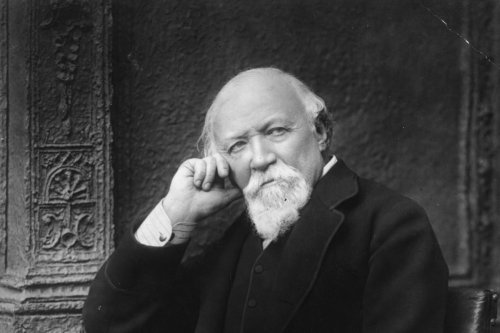
Oh, good gigantic smile o’ the brown old earth,
This autumn morning! How he sets his bones
To bask i’ the sun, and thrusts out knees and feet
For the ripple to run over in its mirth;
Listening the while, where on the heap of stones
The white breast of the sea-lark twitters sweet.
That is the doctrine, simple, ancient, true;
Read Poem This autumn morning! How he sets his bones
To bask i’ the sun, and thrusts out knees and feet
For the ripple to run over in its mirth;
Listening the while, where on the heap of stones
The white breast of the sea-lark twitters sweet.
That is the doctrine, simple, ancient, true;
0
Amor Vincit Omnia by Edgar Bowers

Love is no more.
It died as the mind dies: the pure desire
Relinquishing the blissful form it wore,
The ample joy and clarity expire.
Regret is vain.
Then do not grieve for what you would efface,
The sudden failure of the past, the pain
Of its unwilling change, and the disgrace.
Read Poem It died as the mind dies: the pure desire
Relinquishing the blissful form it wore,
The ample joy and clarity expire.
Regret is vain.
Then do not grieve for what you would efface,
The sudden failure of the past, the pain
Of its unwilling change, and the disgrace.
0
An Essay on Criticism: Part 1 by Alexander Pope

Si quid novisti rectius istis,
Candidus imperti; si non, his utere mecum
[If you have come to know any precept more correct than these, share it with me, brilliant one; if not, use these with me] (Horace, Epistle I.6.67)
PART 1
Read Poem Candidus imperti; si non, his utere mecum
[If you have come to know any precept more correct than these, share it with me, brilliant one; if not, use these with me] (Horace, Epistle I.6.67)
PART 1
0
An Essay on Man: Epistle I by Alexander Pope

To Henry St. John, Lord Bolingbroke Awake, my St. John! leave all meaner things
To low ambition, and the pride of kings.
Read Poem To low ambition, and the pride of kings.
0
Astrophil and Stella 3: Let dainty wits cry on the sisters nine by Sir Philip Sidney

Let dainty wits cry on the sisters nine,
That, bravely mask'd, their fancies may be told;
Or, Pindar's apes, flaunt they in phrases fine,
Enam'ling with pied flowers their thoughts of gold.
Or else let them in statelier glory shine,
Ennobling newfound tropes with problems old;
Or with strange similes enrich each line,
Of herbs or beasts which Ind or Afric hold.
For me, in sooth, no Muse but one I know;
Phrases and problems from my reach do grow,
And strange things cost too dear for my poor sprites.
How then? even thus: in Stella's face I read
What love and beauty be; then all my deed
But copying is, what in her Nature writes.
Read Poem That, bravely mask'd, their fancies may be told;
Or, Pindar's apes, flaunt they in phrases fine,
Enam'ling with pied flowers their thoughts of gold.
Or else let them in statelier glory shine,
Ennobling newfound tropes with problems old;
Or with strange similes enrich each line,
Of herbs or beasts which Ind or Afric hold.
For me, in sooth, no Muse but one I know;
Phrases and problems from my reach do grow,
And strange things cost too dear for my poor sprites.
How then? even thus: in Stella's face I read
What love and beauty be; then all my deed
But copying is, what in her Nature writes.
0
Astrophil and Stella 41: Having this day my horse, my hand, my lance by Sir Philip Sidney

Having this day my horse, my hand, my lance
Guided so well that I obtain'd the prize,
Both by the judgment of the English eyes
And of some sent from that sweet enemy France;
Horsemen my skill in horsemanship advance,
Town folks my strength; a daintier judge applies
His praise to sleight which from good use doth rise;
Some lucky wits impute it but to chance;
Others, because of both sides I do take
My blood from them who did excel in this,
Think Nature me a man of arms did make.
How far they shot awry! The true cause is,
Stella look'd on, and from her heav'nly face
Sent forth the beams which made so fair my race.
Read Poem Guided so well that I obtain'd the prize,
Both by the judgment of the English eyes
And of some sent from that sweet enemy France;
Horsemen my skill in horsemanship advance,
Town folks my strength; a daintier judge applies
His praise to sleight which from good use doth rise;
Some lucky wits impute it but to chance;
Others, because of both sides I do take
My blood from them who did excel in this,
Think Nature me a man of arms did make.
How far they shot awry! The true cause is,
Stella look'd on, and from her heav'nly face
Sent forth the beams which made so fair my race.
0
Astrophil and Stella 7: When Nature made her chief work, Stella's eyes by Sir Philip Sidney

When Nature made her chief work, Stella's eyes,
In colour black why wrapt she beams so bright?
Would she in beamy black, like painter wise,
Frame daintiest lustre, mix'd of shades and light?
Or did she else that sober hue devise,
In object best to knit and strength our sight;
Lest, if no veil these brave gleams did disguise,
They, sunlike, should more dazzle than delight?
Or would she her miraculous power show,
That, whereas black seems beauty's contrary,
She even in black doth make all beauties flow?
Both so, and thus,she,minding Love should be
Plac'd ever there, gave him this mourning weed
To honour all their deaths who for her bleed.
Read Poem In colour black why wrapt she beams so bright?
Would she in beamy black, like painter wise,
Frame daintiest lustre, mix'd of shades and light?
Or did she else that sober hue devise,
In object best to knit and strength our sight;
Lest, if no veil these brave gleams did disguise,
They, sunlike, should more dazzle than delight?
Or would she her miraculous power show,
That, whereas black seems beauty's contrary,
She even in black doth make all beauties flow?
Both so, and thus,she,minding Love should be
Plac'd ever there, gave him this mourning weed
To honour all their deaths who for her bleed.
0
Astrophil and Stella 71: Who will in fairest book of nature know by Sir Philip Sidney

Who will in fairest book of nature know
How virtue may best lodg'd in beauty be,
Let him but learn of love to read in thee,
Stella, those fair lines which true goodness show.
There shall he find all vices' overthrow,
Not by rude force, but sweetest sovereignty
Of reason, from whose light those night-birds fly;
That inward sun in thine eyes shineth so.
And, not content to be perfection's heir
Thyself, dost strive all minds that way to move,
Who mark in thee what is in thee most fair.
So while thy beauty draws thy heart to love,
As fast thy virtue bends that love to good:
But "Ah," Desire still cries, "Give me some food!"
Read Poem How virtue may best lodg'd in beauty be,
Let him but learn of love to read in thee,
Stella, those fair lines which true goodness show.
There shall he find all vices' overthrow,
Not by rude force, but sweetest sovereignty
Of reason, from whose light those night-birds fly;
That inward sun in thine eyes shineth so.
And, not content to be perfection's heir
Thyself, dost strive all minds that way to move,
Who mark in thee what is in thee most fair.
So while thy beauty draws thy heart to love,
As fast thy virtue bends that love to good:
But "Ah," Desire still cries, "Give me some food!"
0
Experience by Ralph Waldo Emerson
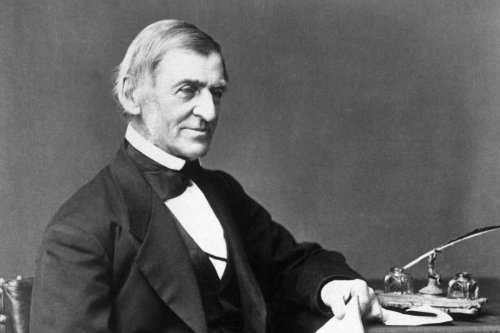
The lords of life, the lords of life,—
I saw them pass,
In their own guise,
Like and unlike,
Portly and grim,—
Use and Surprise,
Surface and Dream,
Succession swift and spectral Wrong,
Read Poem I saw them pass,
In their own guise,
Like and unlike,
Portly and grim,—
Use and Surprise,
Surface and Dream,
Succession swift and spectral Wrong,
0
The Human Seasons by John Keats

Four Seasons fill the measure of the year;
There are four seasons in the mind of man:
He has his lusty Spring, when fancy clear
Takes in all beauty with an easy span:
He has his Summer, when luxuriously
Spring's honied cud of youthful thought he loves
To ruminate, and by such dreaming high
Is nearest unto heaven: quiet coves
His soul has in its Autumn, when his wings
He furleth close; contented so to look
On mists in idleness—to let fair things
Pass by unheeded as a threshold brook.
He has his Winter too of pale misfeature,
Or else he would forego his mortal nature.
0
In Memoriam A. H. H. OBIIT MDCCCXXXIII: 3 by Alfred, Lord Tennyson
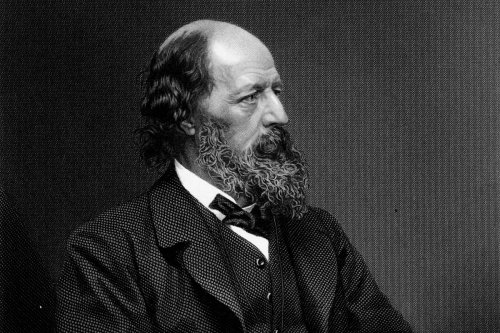
O Sorrow, cruel fellowship,
O Priestess in the vaults of Death,
O sweet and bitter in a breath,
What whispers from thy lying lip?
"The stars," she whispers, "blindly run;
A web is wov'n across the sky;
From out waste places comes a cry,
And murmurs from the dying sun:
Read Poem O Priestess in the vaults of Death,
O sweet and bitter in a breath,
What whispers from thy lying lip?
"The stars," she whispers, "blindly run;
A web is wov'n across the sky;
From out waste places comes a cry,
And murmurs from the dying sun:
0
In Memoriam A. H. H. OBIIT MDCCCXXXIII: 5 by Alfred, Lord Tennyson

I sometimes hold it half a sin
To put in words the grief I feel;
For words, like Nature, half reveal
And half conceal the Soul within.
But, for the unquiet heart and brain,
A use in measured language lies;
The sad mechanic exercise,
Read Poem To put in words the grief I feel;
For words, like Nature, half reveal
And half conceal the Soul within.
But, for the unquiet heart and brain,
A use in measured language lies;
The sad mechanic exercise,
0
In Memoriam A. H. H. OBIIT MDCCCXXXIII: 55 by Alfred, Lord Tennyson

The wish, that of the living whole
No life may fail beyond the grave,
Derives it not from what we have
The likest God within the soul?
Are God and Nature then at strife,
That Nature lends such evil dreams?
So careful of the type she seems,
So careless of the single life;
That I, considering everywhere
Her secret meaning in her deeds,
And finding that of fifty seeds
She often brings but one to bear,
Read Poem No life may fail beyond the grave,
Derives it not from what we have
The likest God within the soul?
Are God and Nature then at strife,
That Nature lends such evil dreams?
So careful of the type she seems,
So careless of the single life;
That I, considering everywhere
Her secret meaning in her deeds,
And finding that of fifty seeds
She often brings but one to bear,
0
In Memoriam A. H. H. OBIIT MDCCCXXXIII: 83 by Alfred, Lord Tennyson

Dip down upon the northern shore
O sweet new-year delaying long;
Thou doest expectant nature wrong;
Delaying long, delay no more.
What stays thee from the clouded noons,
Thy sweetness from its proper place?
Can trouble live with April days,
Or sadness in the summer moons?
Bring orchis, bring the foxglove spire,
The little speed well's darling blue,
Deep tulips dash'd with fiery dew,
Laburnums, dropping-wells of fire.
Read Poem O sweet new-year delaying long;
Thou doest expectant nature wrong;
Delaying long, delay no more.
What stays thee from the clouded noons,
Thy sweetness from its proper place?
Can trouble live with April days,
Or sadness in the summer moons?
Bring orchis, bring the foxglove spire,
The little speed well's darling blue,
Deep tulips dash'd with fiery dew,
Laburnums, dropping-wells of fire.
0
It is a Beauteous Evening, Calm and Free by William Wordsworth

It is a beauteous evening, calm and free,
The holy time is quiet as a Nun
Breathless with adoration; the broad sun
Is sinking down in its tranquility;
The gentleness of heaven broods o'er the Sea;
Listen! the mighty Being is awake,
And doth with his eternal motion make
A sound like thunder—everlastingly.
Dear child! dear Girl! that walkest with me here,
If thou appear untouched by solemn thought,
Thy nature is not therefore less divine:
Thou liest in Abraham's bosom all the year;
And worshipp'st at the Temple's inner shrine,
God being with thee when we know it not.
Read Poem The holy time is quiet as a Nun
Breathless with adoration; the broad sun
Is sinking down in its tranquility;
The gentleness of heaven broods o'er the Sea;
Listen! the mighty Being is awake,
And doth with his eternal motion make
A sound like thunder—everlastingly.
Dear child! dear Girl! that walkest with me here,
If thou appear untouched by solemn thought,
Thy nature is not therefore less divine:
Thou liest in Abraham's bosom all the year;
And worshipp'st at the Temple's inner shrine,
God being with thee when we know it not.
0
The Mower by Andrew Marvell

Luxurious man, to bring his vice in use,
Did after him the world seduce;
And from the fields the flow’rs and plants allure,
Where nature was most plain and pure.
He first enclos’d within the garden’s square
A dead and standing pool of air;
And a more luscious earth for them did knead,
Which stupefied them while it fed.
Read Poem Did after him the world seduce;
And from the fields the flow’rs and plants allure,
Where nature was most plain and pure.
He first enclos’d within the garden’s square
A dead and standing pool of air;
And a more luscious earth for them did knead,
Which stupefied them while it fed.
0
Nature by Henry Wadsworth Longfellow
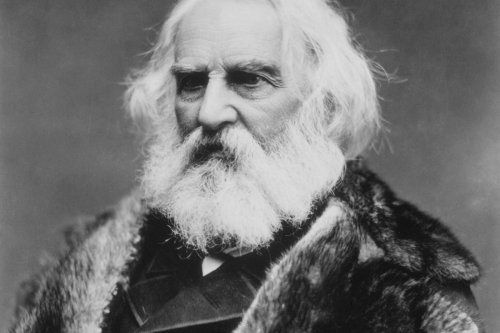
As a fond mother, when the day is o'er,
Leads by the hand her little child to bed,
Half willing, half reluctant to be led,
And leave his broken playthings on the floor,
Still gazing at them through the open door,
Nor wholly reassured and comforted
By promises of others in their stead,
Which, though more splendid, may not please him more;
So Nature deals with us, and takes away
Our playthings one by one, and by the hand
Leads us to rest so gently, that we go
Scarce knowing if we wish to go or stay,
Being too full of sleep to understand
How far the unknown transcends the what we know.
Read Poem Leads by the hand her little child to bed,
Half willing, half reluctant to be led,
And leave his broken playthings on the floor,
Still gazing at them through the open door,
Nor wholly reassured and comforted
By promises of others in their stead,
Which, though more splendid, may not please him more;
So Nature deals with us, and takes away
Our playthings one by one, and by the hand
Leads us to rest so gently, that we go
Scarce knowing if we wish to go or stay,
Being too full of sleep to understand
How far the unknown transcends the what we know.
0
October, 1803 by William Wordsworth

These times strike monied worldlings with dismay:
Even rich men, brave by nature, taint the air
With words of apprehension and despair:
While tens of thousands, thinking on the affray,
Men unto whom sufficient for the day
And minds not stinted or untilled are given,
Sound, healthy, children of the God of heaven,
Are cheerful as the rising sun in May.
What do we gather hence but firmer faith
That every gift of noble origin
Is breathed upon by Hope's perpetual breath;
That virtue and the faculties within
Are vital,—and that riches are akin
To fear, to change, to cowardice, and death?
0
The Pearl by George Herbert

MATTHEW xiii I know the ways of learning; both the head
And pipes that feed the press, and make it run;
Read Poem And pipes that feed the press, and make it run;
0
A Poet! He Hath Put his Heart to School by William Wordsworth

A poet!—He hath put his heart to school,
Nor dares to move unpropped upon the staff
Which art hath lodged within his hand—must laugh
By precept only, and shed tears by rule.
Thy Art be Nature; the live current quaff,
And let the groveller sip his stagnant pool,
In fear that else, when Critics grave and cool
Have killed him, Scorn should write his epitaph.
How does the Meadow-flower its bloom unfold?
Because the lovely little flower is free
Down to its root, and, in that freedom, bold;
And so the grandeur of the Forest-tree
Comes not by casting in a formal mould,
But from its own divine vitality.
0
The Pulley by George Herbert

When God at first made man,
Having a glass of blessings standing by,
“Let us,” said he, “pour on him all we can.
Let the world’s riches, which dispersèd lie,
Contract into a span.”
So strength first made a way;
Then beauty flowed, then wisdom, honour, pleasure.
Read Poem Having a glass of blessings standing by,
“Let us,” said he, “pour on him all we can.
Let the world’s riches, which dispersèd lie,
Contract into a span.”
So strength first made a way;
Then beauty flowed, then wisdom, honour, pleasure.
0
Similar Cases by Charlotte Anna Perkins Gilman
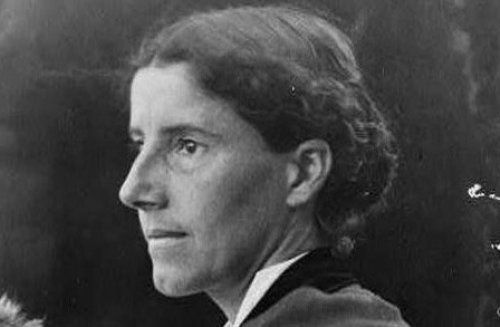
There was once a little animal,
No bigger than a fox,
And on five toes he scampered
Over Tertiary rocks.
They called him Eohippus,
And they called him very small,
And they thought him of no value --
When they thought of him at all;
Read Poem No bigger than a fox,
And on five toes he scampered
Over Tertiary rocks.
They called him Eohippus,
And they called him very small,
And they thought him of no value --
When they thought of him at all;
0
Sonnet 111: O, for my sake do you with Fortune chide, by William Shakespeare

O, for my sake do you with Fortune chide,
The guilty goddess of my harmful deeds,
That did not better for my life provide
Than public means which public manners breeds.
Thence comes it that my name receives a brand,
And almost thence my nature is subdu'd
To what it works in, like the dyer's hand.
Pity me then and wish I were renew'd;
Whilst, like a willing patient, I will drink
Potions of eisel 'gainst my strong infection;
No bitterness that I will bitter think,
Nor double penance, to correct correction.
Pity me then, dear friend, and I assure ye
Even that your pity is enough to cure me.
Read Poem The guilty goddess of my harmful deeds,
That did not better for my life provide
Than public means which public manners breeds.
Thence comes it that my name receives a brand,
And almost thence my nature is subdu'd
To what it works in, like the dyer's hand.
Pity me then and wish I were renew'd;
Whilst, like a willing patient, I will drink
Potions of eisel 'gainst my strong infection;
No bitterness that I will bitter think,
Nor double penance, to correct correction.
Pity me then, dear friend, and I assure ye
Even that your pity is enough to cure me.
0
Still, Citizen Sparrow by Richard Wilbur
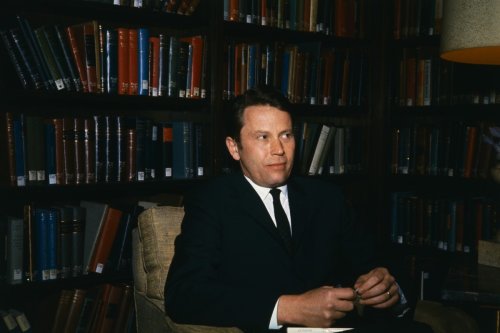
Still, citizen sparrow, this vulture which you call
Unnatural, let him but lumber again to air
Over the rotten office, let him bear
The carrion ballast up, and at the tall
Tip of the sky lie cruising. Then you’ll see
That no more beautiful bird is in heaven’s height,
No wider more placid wings, no watchfuller flight;
He shoulders nature there, the frightfully free,
Read Poem Unnatural, let him but lumber again to air
Over the rotten office, let him bear
The carrion ballast up, and at the tall
Tip of the sky lie cruising. Then you’ll see
That no more beautiful bird is in heaven’s height,
No wider more placid wings, no watchfuller flight;
He shoulders nature there, the frightfully free,
0
Study Nature by Gertrude Stein
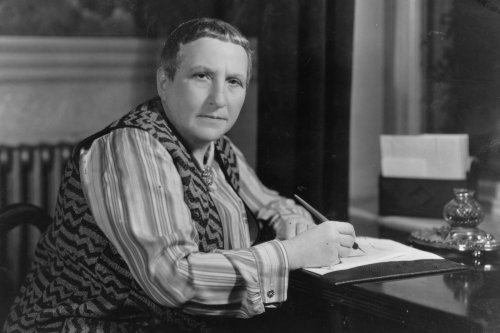
I do.
Victim.
Sales
Met
Wipe
Her
Less.
Was a disappointment
Read Poem Victim.
Sales
Met
Wipe
Her
Less.
Was a disappointment
0
The Tables Turned by William Wordsworth

Up! up! my Friend, and quit your books;
Or surely you'll grow double:
Up! up! my Friend, and clear your looks;
Why all this toil and trouble?
The sun above the mountain's head,
A freshening lustre mellow
Through all the long green fields has spread,
His first sweet evening yellow.
Books! 'tis a dull and endless strife:
Come, hear the woodland linnet,
How sweet his music! on my life,
There's more of wisdom in it.
Read Poem Or surely you'll grow double:
Up! up! my Friend, and clear your looks;
Why all this toil and trouble?
The sun above the mountain's head,
A freshening lustre mellow
Through all the long green fields has spread,
His first sweet evening yellow.
Books! 'tis a dull and endless strife:
Come, hear the woodland linnet,
How sweet his music! on my life,
There's more of wisdom in it.
0
Three Years She Grew by William Wordsworth

Three years she grew in sun and shower,
Then Nature said, "A lovelier flower
On earth was never sown;
This Child I to myself will take;
She shall be mine, and I will make
A Lady of my own.
"Myself will to my darling be
Read Poem Then Nature said, "A lovelier flower
On earth was never sown;
This Child I to myself will take;
She shall be mine, and I will make
A Lady of my own.
"Myself will to my darling be
0
Vitamins and Roughage by Kenneth Rexroth
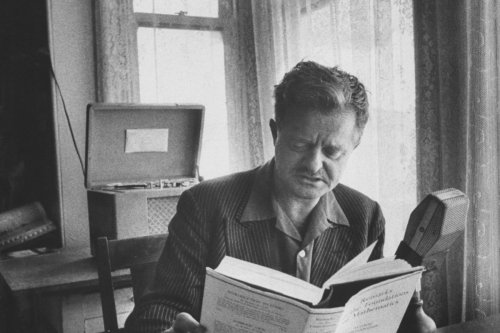
Strong ankled, sun burned, almost naked,
The daughters of California
Educate reluctant humanists;
Drive into their skulls with tennis balls
The unhappy realization
That nature is still stronger than man.
The special Hellenic privilege
Of the special intellect seeps out
Read Poem The daughters of California
Educate reluctant humanists;
Drive into their skulls with tennis balls
The unhappy realization
That nature is still stronger than man.
The special Hellenic privilege
Of the special intellect seeps out
0
The World Is Too Much With Us by William Wordsworth

The world is too much with us; late and soon,
Getting and spending, we lay waste our powers;—
Little we see in Nature that is ours;
We have given our hearts away, a sordid boon!
This Sea that bares her bosom to the moon;
The winds that will be howling at all hours,
And are up-gathered now like sleeping flowers;
For this, for everything, we are out of tune;
Read Poem Getting and spending, we lay waste our powers;—
Little we see in Nature that is ours;
We have given our hearts away, a sordid boon!
This Sea that bares her bosom to the moon;
The winds that will be howling at all hours,
And are up-gathered now like sleeping flowers;
For this, for everything, we are out of tune;
0
Written in London. September, 1802 by William Wordsworth

O Friend! I know not which way I must look
For comfort, being, as I am, opprest,
To think that now our life is only drest
For show; mean handy-work of craftsman, cook,
Or groom! — We must run glittering like a brook
In the open sunshine, or we are unblest:
The wealthiest man among us is the best:
No grandeur now in nature or in book
Delights us. Rapine, avarice, expense,
This is idolatry; and these we adore:
Plain living and high thinking are no more:
The homely beauty of the good old cause
Is gone; our peace, our fearful innocence,
And pure religion breathing household laws.
0